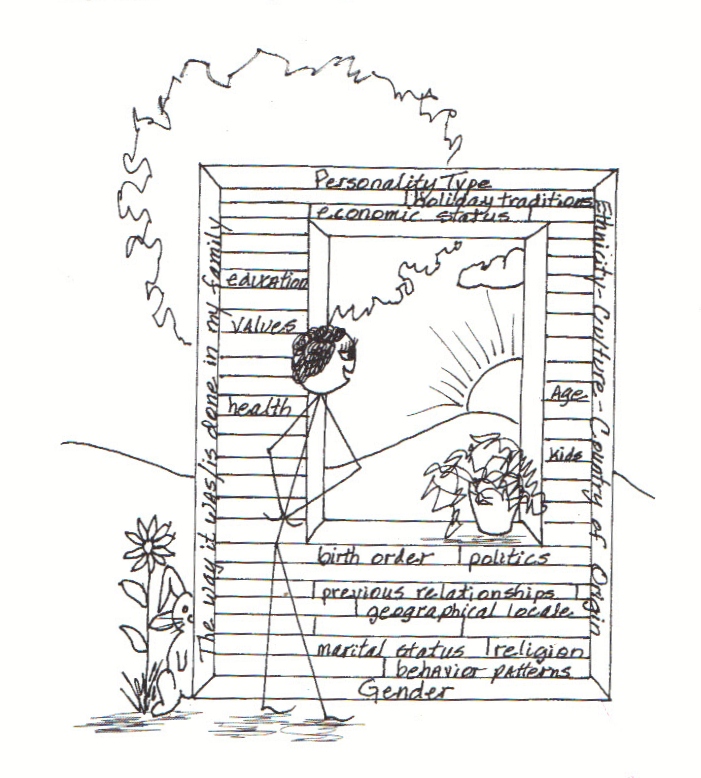An Example
I’ve taught several classes with my friends Ken and Irma. I once looked at Ken and thought, “He looks angry. I wonder if I’ve done something he’s unhappy about. Maybe he thought my part of the presentation wasn’t very good.” (Do you hear the story I’m creating?)
Fortunately I realized what I was doing and asked him, “Ken, are you angry about anything?” He quickly, and sincerely, answered, “No, not at all! Why did you ask?” I replied, “I misread the look on your face… sorry!” And the potential upset was over. Later, I realized that Ken’s face in repose looked a lot like my father’s face when he was angry. I’d superimposed memories of my dad onto Ken’s facial features. If I believed the story I was telling myself, it would have made a painful upset between Ken and me.
Why This Happens

We all have hundreds of relationship memories stored in our unconscious. Without being aware of it, we often filter current experiences through these memories, deriving meaning (perceptions, interpretations) that may…or may not…be accurate. Are your upset feelings based on fact, or a fiction derived from past experiences?
A Potential Upset
Once Jim and I were getting ready to attend our grandson’s Little League game. Jim’s task was to collect the lawn chairs. I put some things in the car, then, as I headed back through the garage to the house, Jim asked, “Where are the lawn chairs?” Instead of stopping to verbally explain that they were hanging from a hook on the wall of the garage, I just pointed to them and continued walking into the house.
After we were on our way, Jim said, “I need to talk.” (For many couples, these are the four most dreaded words in the English language! But since Jim and I had learned to talk things through with respect, I was eager to hear what he had to say.) “Ok, go ahead.”
The Solution: a Perception Check
He said, “When I asked where the chairs were, and you just pointed, it seemed like a put-down…like the message behind your pointing was, ‘You dummy! Can’t you see they are right in front of you?’ Is that what you were thinking?” (Do you hear the great job he did of checking out his interpretation of my gesture? He felt offended, but instead of acting on his hurt feelings and accusing me of disrespect or sulking, he checked out his story to see if it was true. He asked, “Is this upset based on fact, or my fiction?)

The Response Must be Truthful
I checked inside myself to see if there was, indeed, any sense of condescension or judgement. (If there had been, I would have admitted it and immediately, sincerely apologized.) There wasn’t. So I answered, “No. I wasn’t judging you or putting you down for not seeing the chairs. We were in a hurry, so pointing was just faster and easier than stopping to explain.”
Believe the Response to a Perception Check
Because Jim and I had long ago made a pact to always tell each other the truth, he was quiet for a minute and then said, “OK. I believe you. But it will take a few minutes for my feelings to calm down.” We rode in silence for a few minutes, then enjoyed easy conversation for the rest of the hour-long drive to the game.
Perception Checks Prevent a Lot of Unnecessary Upsets
Imagine what a fight could have ensued! And, how the day would have been ruined if Jim had not been willing to check out his internal story to see if it was truth, or fiction! How many times do you tell yourself a story about the meaning behind a word, gesture, facial expression or tone of voice, and lower the quality of that relationship based on an interpretation that may…or may not…be true? Perception Checking prevents a lot of hurt feelings, fights and damaged relationships!
Just this week a new client shared with me a Perception Check that she did with her sister. It immediately cleared up an issue that could have been an upset between them! This skill is so practical!
Checking out upsets to see if they are based on fact or fiction is a powerful, efficient tool that is taught in MODULE TWO of Millionaire Marriage Club and the Stepping TwoGether Edition. Click here to get a seven day free trial to preview either course!
You have my love and support,

